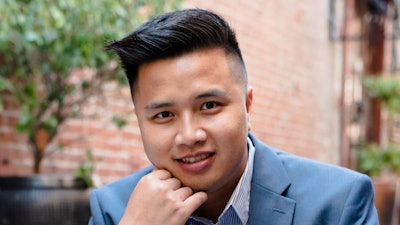One day, while walking to a work meeting at a university in a supposedly progressive Northeast state, I encountered a disheartening sight. A photo depicted an individual holding a sign that read: "Please Speak English." This photo was placed clearly and proudly on a mantel in a student lounge within an office that many non-English speakers frequent. As someone whose first language is Vietnamese, this message felt like a direct attack on my identity and heritage. It was disconcerting to witness such overt discrimination, especially in a professional setting that supposedly champions acceptance and tolerance. The shock of this encounter was amplified by the fact that it occurred at a predominantly white university. Although I should not have been surprised by the existence of such practices, it still caught me off guard and left me feeling defeated.
 Nelson Pham
Nelson Pham
Reflecting on this experience, I am reminded of the words of Minnijean Brown Trickey, one of the courageous Little Rock Nine. During an address at the Harvard Graduate School of Education on Feb. 8, 2018, Ms. Trickey shared her insights on the ongoing struggles of public schools and the pivotal role of educators in driving positive change. One line resonated deeply with me: "When you deny a voice, you deny humanity."
Language is a potent tool in the fight against oppression, which is precisely why practices rooted in white supremacy exert considerable effort to restrict linguistic autonomy. Individuals are denied equitable access to education and coerced into relinquishing their native tongues. The excuses concocted to justify these actions are merely smokescreens for an underlying agenda of deliberate racial discrimination. Policies and practices rooted in such bigotry continue to suppress individuals from diverse cultural backgrounds.
In the realm of higher education, the system's implicit message is clear: conform to the oppressive culture and align with the ideals of the white majority. This expectation harms students of color and those from varied cultural heritages. Educational institutions often look the other way or fail to take proactive measures to dismantle this system. Students who enter these establishments are conditioned to believe that the policies and practices in place are designed with their best interests in mind when, in reality, they primarily serve financial motives.
Students like me, who are already compelled to communicate in English in virtually all facets of daily life, find this expectation particularly burdensome. Whether drafting a memo, completing an assignment, participating in class discussions, or navigating public spaces, we are constantly pressured to assimilate into the prevailing narrative that the English language is inherently superior. Unfortunately, the college or university environment, which should be a defender of free expression, often only extends this privilege to white and English-speaking students.
The lack of space in education for students of color and those from different cultural backgrounds to be their authentic selves is a glaring injustice. These students are stripped of their humanity and forced into subservience to a white-dominated ideology. Despite facing numerous obstacles and challenges, these resilient students persevere through oppressive conditions. They possess a strength that is often underestimated, refusing to let their voices be silenced and rejecting the racist practices that seek to diminish their worth. They are warriors in the truest sense, battling against unimaginable odds.





















